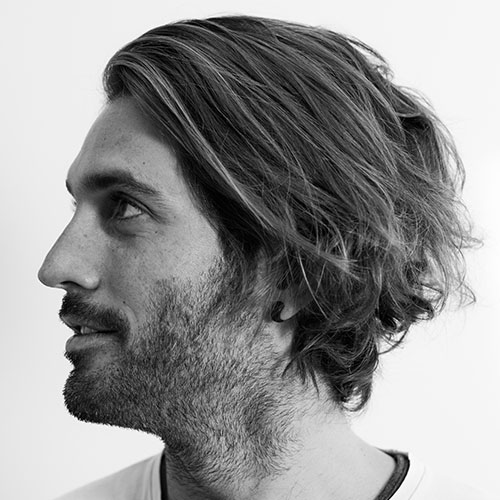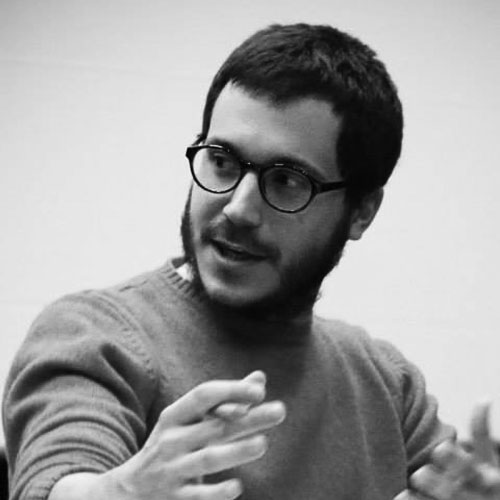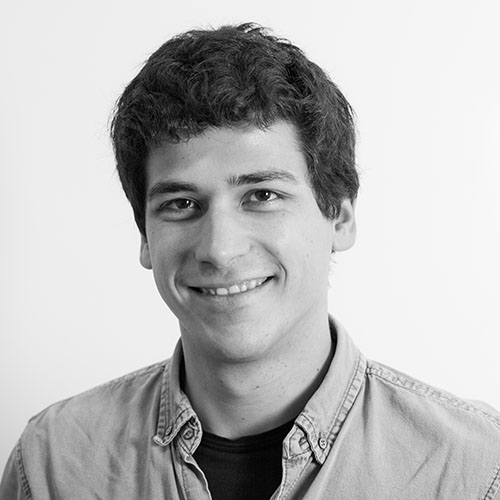



For this fado the audience doesn’t need to be silent. “You can clap, dance, take out your clothes, do whatever you feel like doing”, says Lila Fadista, a nearly two metres tall queer artist with a thick beard who exudes swag and boldness: a ‘queer activist’ covered in rainbow coloured tulle. We are at Zé dos Bois Gallery bar, the trendy number 49 of Bairro Alto, the old Lisbon neighbourhood famous for its bustling night-life. It is here that Lila and João Caçador, the guitar player, perform once a month. The two are Fado Bicha (Queer Fado), a band that breaks away with the conventions of the national Portuguese song, classified by UNESCO in 2011 as intangible cultural heritage of humanity. Fado Bicha defies Fado’s traditions by bringing into its lyrics the stories of lesbians, gays, bisexuals, trans and intersex (lgbti).
“I am Lila, the singer of Fado Bicha, and I welcome you to a night filled with the delights we have prepared for you today. As homosexuals, we have never been represented in fado song lyrics. We have always loved fado, so we wanted to use it as a tool to express ourselves, to increase our community’s visibility.”
While Lila shines at the forefront of the stage, João Caçador is always in the background, as her own shadow. She, a temptress, her hips voluptuously shaking to the sound of the music. He, imbued with a restrained charm. The electric guitar announces itself, playing the first chords of ‘The Down-low Chronicles’, a version of Artur Ribeiro’s classic ‘Nem às paredes confesso / Even to the walls, I will not confess’ popularized by Amália Rodrigues. Lila liberates her moving deep voice into the microphone:
“All the secretive machos, all the straight acting guys here in this room – I know that there are some – all the married men on the down-low, this one is about you!”
“Hundred metres away from me
At the Christ the King statue
I´m not sending you photos for I´m not gay
I just wish to explore new desires
But without seeing each other,
Without saying too much
And no kissing!
My girlfriend is the one I love!
Please, you see, she cannot know about it.
Stop sending me messages
I will delete Grindr
My girlfriend is the one I truly love!
Yesterday it was a close shave…
But she didn’t see us.
No more coffees by the river.
Stop going on about love! I’m not evil…
I will say it again and again:
My cock is to blame!”
“The living room is a mess but ok, let’s get in. A toast, to ourselves! I don’t know if we have enough wine for what will follow…”
Half an hour later, João Caçador is ringing the bell, and joins the conversation. João is familiar with the fado world. In January, he has released his first single as a singer ‘Placeless Love’ with music by Mário Laginha. His friendship with Lila started one year ago, when guitar player João, who holds a degree in Jazz and Modern Music, asked Tiago Lila, a Psychology graduate, if he wanted to schedule a rehearsal.
Lila: “I was really excited because at the time I was singing a cappella with some dodgy instrumentals, but it wasn´t sustainable, I got pleasure out of it, but I needed more. We arranged a meeting and he told me – Ok, sing something…– I felt so embarrassed, so I refused to sing.”
João: “He was just being difficult.”
Lila: “No, I wasn´t, I was so nervous. In the end, I managed to sing.”
João: “We did a rehearsal together, and from then on 100% sisters, BFFs. Straight away we were sharing the happiness, sorrows, and betrayals of our love lives.”
João: “He thought I was hot, didn´t you?”
Lila: “No, not at all.”
João: “Really? You didn´t think I was steaming hot?”
Lila: “Hmm, well, I did!”
Regardless of these gossip details, that was how João and Lila adorned fado with new clothes and gave it an additional name: Queer (Bicha). Queer because it is not traditional. Queer because it dares to fearlessly show its face. Queer because it is not ashamed to be what it is. The melodies are those of traditional fado, with musical arrangements for electrical guitar, which replaces the Portuguese guitar and fado viola. As for the lyrics, almost all were adapted by Tiago who added new words, changed whole verses, and in two cases penned two new full poems.
“Fado is rooted in four elements: melody, harmony, rhythm, and the lyrics. Its main role has always been to tell a story: about the city, about love’s joys and sorrows. That’s exactly what we do: we tell stories, they are just different from those heteronormative stories that people are expecting to listen. We have received many hate messages in social media, many fado musicians saying that what we are doing is not fado. I have my own explanation for that: the songs we play are drawn from fado’s repertory, but if people want to call it something else, I don´t really care. It is not fado, but queer fado”, adds João Caçador while Tiago Lila starts doing her makeup, highlighting her small and narrow eyes with a black pencil to make them look bigger.
In his arm, Tiago has tattooed a deer with an empty triangle on its torso, bringing to mind the inverted pink triangle homosexuals were forced to use in Nazi concentration camps.
“Depending on how they are said, words can mean many things. We just simply pick up terms that carry a negative connotation and use them differently, in a sort of defiant cathartic experience. We transform the word bicha which has been used as an insulting weapon against us for so many years, an insulting word proxy for freaks, despicable, punching bags. We have turned it into a fighting tool. I´m bicha and I´m proudly bicha. Not all homosexuals are bichas, a heterosexual can be a bicha – to be bicha requires guts! Amália was an amazing big bicha because she broke away from many of fado´s conventions: she was the first to sing Camões [a sixteenth century poet considered to be Portuguese major poet], she found herself on the receiving hand of public outrage because she had adapted one of his poems,” says João Caçador.
We have also received hate messages from many homosexuals and transvestites, even Belle Dominique, who used to appear on the TV during the 90s. I mean, posts sayings ‘shame on you, you are giving a bad name to drag’, loaded with insulting terms such as ‘aberrations’, ‘freaks’, ‘you should be ashamed of yourselves,’ adds Tiago.
There is the real fado, the real drag, and the Queer Fado which is simultaneously all and none of those things. Maybe you are wondering by now, whether Tiago Lila and Lila the fado singer, are one and the same person. Lila, both a Portuguese surname, and a women’s first name. Felt as a “double curse”, Tiago rejected it during his childhood. Today, he wears it proudly. So yes, “depending on the context” they are the same person. Tiago Lila is Lila, the fado singer, when she is on the stage.
“Lila, willy, sissy, you can imagine…,” he adds, “not only I was gay but I had this girlie surname, Lila. I am Tiago Lila and Lila, the fado singer is how I present myself while on stage. It is not a character, it is simply how I express myself. We don’t behave the same way across all contexts: among family, friends, or on our jobs.”
It may be more complex to understand why Tiago Lila assumes himself both as a transgender and agender person, whereas Lila Fadista is a transvestite. Sexual orientation, gender identity, gender expression and biological sex are expressions that glide over a wide spectrum, containing a myriad of combinations. They cannot be reduced to the concepts we like use to use to compartmentalize all things related with forms of sexuality and affection. The richness of this diversity becomes even more complex and fluid when we bring in labels such as cisgender, transgender, transvestite, transsexual, intersex. Why not stop to understand some of these differences.
João Caçador, a volunteer in an association of LGBTI youth and supporters (Rede Ex-Aequo), has been raising awareness about these topics in public schools.
Sexual orientation – related to sexual desire. A person might feel attracted to people from a specific gender, from all genders or none.
Gender identity – the gender with which we identify (mentally): male, female, their combination or none.
Gender expression – the way a person choses to show herself/himself, the way she/he looks. It’s something culturally perceived and it changes throughout time – for example, now-a-days, make-up is something associated to the female gender, but 500 years ago only men would used it.
Biological sex – the sex assigned to a person at birth, based on its genitalia. A common assumption is that the genitalia – vagina / penis – determine gender. However, this is not true.
Cisgender – a person who identifies with the gender assigned to her/him at birth.
Transgender – a person who does not identifies herself/himself with the gender assigned to her/him at birth.
Transsexual – a person who does not identifies herself/himself with the gender assigned to her/him at birth and that has already initiated the process of sex change.
Transvestite – a person whose gender expressions differs from the gender socially assigned to her/him.
Intersex – a person with an ambiguous biological sex.
Hermaphrodite – a popular term incorrectly used to designate intersex people. Physicians, activists, and researchers only use it when speaking of plants and irrational animals.
So, our gender expression can be different to our gender identity. Someone can identify as a man, be attracted to women and wear women’s clothes.
“I don’t identify myself with a woman nor with a man. I am agender. This is something new in my life. I came out as gay at a very young age (twelve years old), and I put aside the gender issue. Only later did I understand that homosexual does not fully define me. That is why I assume myself as transgender: My gender identity as agender is different to the one assigned to me at birth, male.”, explains Tiago Lila.
Fado Bicha has been playing mostly on alternative venues. But that is changing. On 20 April, during the Festival Política they played to a crowd of 500 fans at the São Jorge Cinema venue, in Lisbon. In the audience, for the first time, their parents. Contrasting reactions: João’s mum proudly sitting on the first row was totally smitten by his son’s performance; whereas Tiago’s father and mother-in-law made no comments; but at least they were there. Both band members agree that this may stem from the roles each play within the group – João Caçador perceived as the traditional man, and Lila as the androgynous performer. Is art what they do? “Of course it is!”, they both answer, simultaneously. An unapologetically “political” and “activist” art aiming at deconstructing the fixed borders between male and female gender… and some more.
“After that show, we were asked why did we sing ‘Mulher do Fim do Mundo’ from Brazilian black singer Elza Soares.” says João Caçador, “A white male approached Tiago and told him that that was not our fight, that we had no right to take on the protest of a marginalized black woman and to sing it. This song is about colonization, about black skin, about being marginalized and be kept in the margins. It was a homage to Marielle Franco, the Brazilian black lesbian councillor recently murdered in Rio de Janeiro. There is space on the stage for all this. Fado Bicha wants to unite all struggles!”
In that show they received a standing ovation, and were introduced by Rosa Monteiro, the Secretary of State for Citizenship and Equality. Ironically, Lila, the fado singer, wonders if they are still on the right path, “We wanted to create a provocative and subversive project, and then we have a Government member opening our concert… I’m not sure whether we should be rejoicing or packing our stuff and retiring”, were the first words he said once he got on the microphone. It seems that in the end the decision was to pack and advance into new spaces: as part of the International Day Against Homophobia, Transphobia & Biphobia commemorations they performed in Bragança’s first LGBTI pride parade. An initiative frowned upon by the political ecosystem of this Northern Portugal rural city. A city council vote in support of the event proposed by the Left Block (Bloco de Esquerda) was met with 43 abstentions, 18 votes for, and 1 against it, from Social Democrat Fernando Gonçalves, who described it as a “lamentable” event.
“We went to Bragança because it is a rural city; we really want to get out of Lisbon, and sing all over the country. Outside the big urban cities, there are few cultural venues, and consequently fewer LGBTI spaces. We will open a new discussion, even if only for two hours.”
Sylvia Koonz, the reigning winner of Lisbon’s 1st Miss Drag Competition, storms out of the bathroom, where she has been in front of the mirror transforming herself for more than one hour. We hear catcalls in the form of whistles.
João is stunned, “Fierce!”
“Are you ready? Have you packed everything you’ll need?” says Lila.
“Yes, but it feels so hot,” complains Sylvia.
“Let’s go, then. We are already running late,” concludes Lila.
It’s not even yet the time for the performers to enter the stage, and the 49 bar of the Zé dos Bois Gallery is already crowded: many friends of the duo, people belonging to the LGBTI community, tourists, and many curious punters. Those watching the show for the first time cannot hide their astonishment. A women in the early 30s is awaken from a mesmerising state when her friend nudges her with his elbow. One cannot avoid having the feeling that Lila has been singing fado all her life, but it was only a little over than a month ago that she left her ‘real’ job to dedicate herself full time to singing.
“When I was around thirteen years old and had just bought Madonna’s Ray of Light, I remember my father asking me: ‘Do you really think that Madonna sings better than Amália Rodrigues? There is no comparison: Amália is on a different level!’ I remember thinking arrogantly, “but who even cares about Amália? In a few years, she will have been completely forgotten.”
The above quote comes from a text in the Queerquivo, an online archive of Portuguese LGBTI famous people, in which Lila, the fado singers writes about her memories. There, she adds: “I have to say, that at this time, my mother died, from a prolonged disease. Both my grandmothers took turns, week after week, to come to our house and take care of me. In the school and on my street I was bullied every day, being insulted for a homosexuality of which I was not even myself aware of at that age. A sensitive intelligent girly boy, all characteristics who did not bode well for my future. Years later, Amália joined the pantheon of divas who helped liberate my femininity from that place of shame and tragedy, and to find force precisely in expressing it out and loud. And her voice… A voice with no limits, at the same time dark, sensual, vulnerable, and firm. In it I found the consolation of a mother’s embrace, I found the force to raise it as an unfurled flag or to let it cover me as a shroud.”
The concert approaches its end, and the voice of Lila suddenly is no longer heard in the room. The band is betrayed by a technical glitch. João Caçador tries to fix the sound of the microphone, with no success. But there is no problem. It’s an informal environment and these type of errors are part of the band’s empathy with its audience. Lila projects her voice, singing without a microphone, and the party goes on: “I would like to feel more engagement coming from you, more jumping, more shouting, more inner fire. Pride for our community, our potential, and our richness. The next song is the ‘Pride Parade’, which did not go smoothly the first time we played it. You can stand up, if you wish:”
“Clad in a multitude of colours,
Lisbon trembles every June
Glitter waterfalls
Wigs are unicorns’ manes
Raise proudly your fist
Today is our day
To parade and take over the streets
Here and now, stand proudly on the world
Take the flag out of the closet
And join our community´s clear roar
No less no more
Equal rights now!
A multi-coloured minority
Noisy and fierce
Girlfriends in every corner!
We exist, we love, and we smile!
Here comes the Gay Pride Parade!
Our megaphones aimed
At the people and the State
In diverse ways
We bring a Carnival
From Príncipe Real to Ribeira das Naus
Overflowing the city with a full alphabet
From the down-low macho to the trans-woman
It is like that, it is urgent!
And everybody is joining in
And they’re bringing along
Their proud parents too!”




If you would like to contribute with suggestions for future projects, please write to: